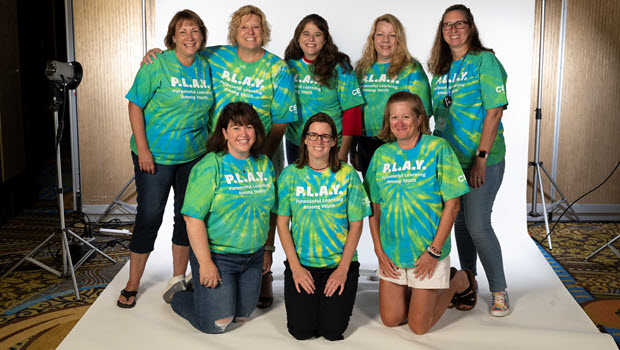Play-based learning is one of the many priorities CEA has been advocating for this legislative session and it has now passed both the House and Senate, enabling young children to learn in developmentally appropriate ways in schools across Connecticut.
The new legislation requires schools to provide play-based learning for kindergarten and preschool students and requires boards of education to permit teachers to utilize play-based learning in first through fifth grades.
“I’m very excited to see that play will be happening in pre-K and kindergarten and that it’s permissive in grades one through five,” says CEA Vice President Joslyn DeLancey, a strong proponent of the legislation. “It means all of our elementary teachers will have the ability to utilize play-based pedagogies without any sort of repercussion in terms of teacher evaluation or sticking to a pacing guide. If teachers can access academic content through play-based teaching, then they have a right to do that.”
For years elementary teachers have seen testing and an emphasis on reading and math instruction erode play-based learning in the earliest grades.
Under the leadership of Wallingford teacher Jamie Hocking-Ferrone, CEA’s Commission for Instruction and Professional Development (CIPD) surveyed kindergarten through third grade teachers on the developmental appropriateness of instruction taking places in those grades. CEA’s Teacher Development Specialist Kate Field says the teachers surveyed reported a dramatic reduction of play in the early grades and a shift toward more direct instruction to prepare for tests.
“Direct instruction is not developmentally appropriate and tends to result in only short-term gains, as opposed to learning through play, which is more durable,” Field says. “One of the other big findings from that study was that teachers were reporting a dramatic increase in behavioral problems as well as more anxiety in the early grades.”
At the 2022 CEA Representative Assembly Hebron teacher Chris Lapsis put forth a new business item, adopted by that assembly, instructing CEA to actively pursue a legislative agenda that addresses play-based learning.
“After the CEA RA, CIPD paired up with the Legislative Commission last summer, shared the results of the survey, and worked with the legislative commission to draft language for proposed play-based learning in the early grades,” says Field. CEA policy staff also put together a policy brief on play-based learning to help educate legislators on its critical importance in the early grades.
CEA and the Connecticut Association of Schools worked together to move the legislation forward, building a coalition around the issue. The coalition, which included the Connecticut chapter of the American Academy of Pediatrics, the Yale Child Study Center, the LEGO Foundation, and the Connecticut Psychological Association, among others, reviewed CEA’s draft play-based learning legislation, gave feedback, and considered possible roadblocks to the legislation’s passage.
“When it came time, thanks to the coalition, we had a lot of experts lined up to testify on the bill,” says Field. “Teachers were a big voice, but we also had medical professionals, psychologists, and others who joined teachers in testifying and contacting legislators.”
“This legislation is a testament to member input, collaboration, and voice,” says DeLancey. “Our wonderful government relations and policy staff came together and really built and advocated for legislation that can support not only students and their learning and development but also teachers and their autonomy.”







